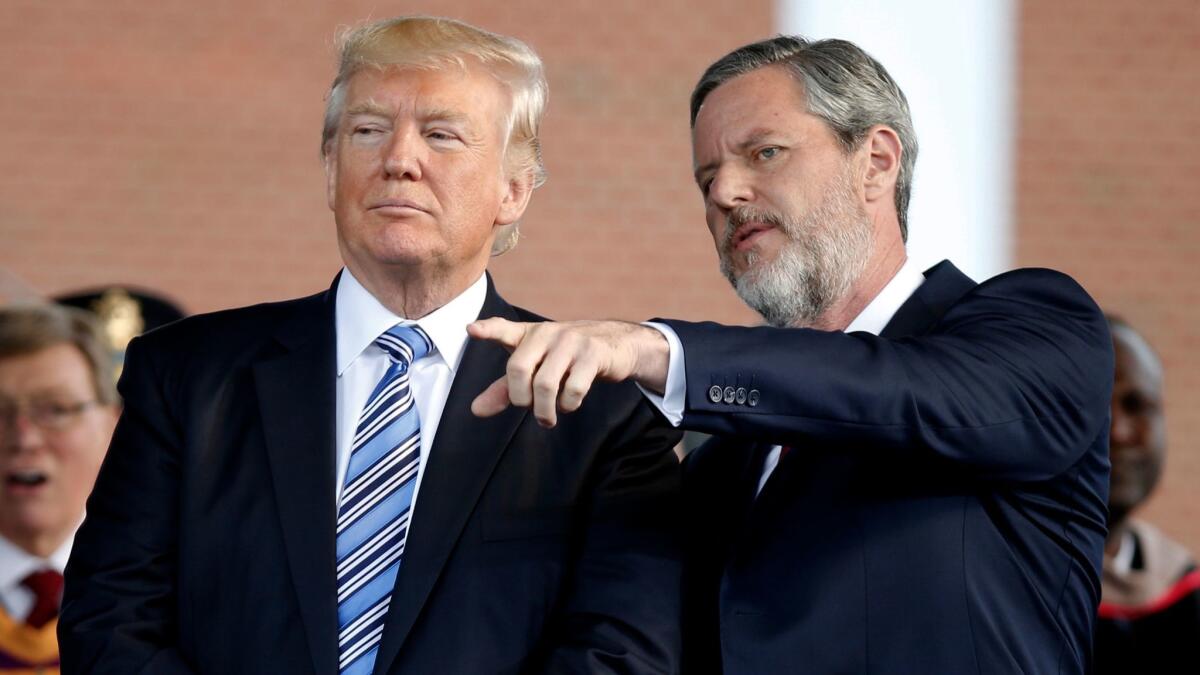Op-Ed: Under Trump, evangelicals show their true racist colors

- Share via
The statistics tell one story: 81% of white evangelicals voted for Donald Trump. The deafening silence from leaders of the religious right in the wake of the neo-Nazi violence in Charlottesville, Va., points to an even larger one, which places racism at the very heart of the movement.
On the face of it, evangelical support for Trump is anomalous. How can a movement ostensibly concerned about “family values” support a twice-divorced, thrice-married man who said that his “personal Vietnam” was avoiding sexually transmitted diseases? How could evangelicals vote for someone who flaunted his infidelities and who boasted about his tawdry behavior toward women?
For the record:
12:35 p.m. Aug. 23, 2017This article originally stated that Tony Perkins did not issue a statement about the violence in Charlottesville. He did, but did not issue one specifically condemning Trump’s response.
The standard rejoinder is that evangelicals were so concerned about abortion and, therefore, judicial appointments that they were prepared to ignore Trump’s indiscretions to advance the one cause — opposition to abortion — that lay at the core of their political movement. That argument collapses, however, on historical examination.
Several evangelical leaders and evangelical organizations applauded the 1973 Roe vs. Wade decision. The late Paul Weyrich, architect of the religious right, was emphatic that abortion had nothing whatsoever to do with the genesis of evangelical political activism in the 1970s, a sentiment echoed by other conservative leaders, including Richard Viguerie and Grover Norquist.
What does it tell us when businessmen demonstrate a greater moral resolve than ministers?
What galvanized Jerry Falwell and other leaders in the 1970s was not abortion, which they considered a “Catholic issue.” They mobilized instead to protest the rescission of tax-exempt status at Bob Jones University and other “segregation academies.” (Falwell had opened his own segregation academy in Lynchburg, Va., in 1967.) Only later, in advance of the 1980 election, did Weyrich and others recognize that abortion could mobilize grass-roots evangelical voters.
Evangelicals’ overwhelming support for Trump represents not so much a concern for securing a “pro-life” judiciary as a return to the founding principles of their political movement. Trump himself may or may not be a racist, but his campaign rhetoric undeniably appealed to racist sentiments: his assertion that a judge of Mexican heritage could not be impartial, his characterization of Mexican immigrants as rapists, his castigation of Muslims.
The 2016 presidential election, then, allowed the religious right finally to dispense with the fiction that theirs was a movement concerned about family values. Evangelical voting behavior suggests that the religious right was merely reverting to the racism that prompted its entry into the political arena in the late 1970s.
If this interpretation is mistaken, if the religious right — or at least its leadership — is not racist, then we might reasonably expect that the leaders of the movement would rush to condemn white supremacists and the equivocal responses of the president, who blamed the violence in Charlottesville on “both sides.” Where are these evangelical voices of condemnation?
In a word, nowhere.
What about Richard Land, former official of the Southern Baptist Convention and now president of Southern Evangelical Seminary? Land was unsparing in his criticisms of Presidents Clinton and Obama, and he once worried that Hillary Clinton would “park her broomstick” at the Supreme Court. Regarding Trump, however, Land has been uncharacteristically silent.
How about Tony Perkins, head of the Family Research Council and frequent visitor to the White House? Perkins, who addressed white nationalist groups when he was a state legislator in Louisiana and who has had dealings with David Duke, former grand wizard of the Ku Klux Klan, issued a statement condemning the violence in Charlottesville, but not one condemning Trump.
Where’s Ralph Reed or Paula White or James Dobson, who in the course of the 2016 campaign pronounced Trump a “baby Christian”? (He was half right.) All of them have vocally supported the president, but they have remained mute on his relationship to racism and white supremacy.
To my knowledge, only one member of the president’s 25-person Evangelical Advisory Board, A.R. Bernard of Brooklyn’s Christian Cultural Center, has stepped down — and that was several days after Trump’s equivocation. By way of contrast, several business executives immediately resigned from economic advisory boards in protest against Trump’s equivocation.
What does it tell us when businessmen demonstrate a greater moral resolve than ministers?
In fairness, several evangelical leaders have spoken out, but their responses could hardly be characterized as denunciations of white supremacy. Franklin Graham cried “shame” on those who were trying to blame Trump for what happened in Charlottesville. Robert Jeffress, pastor of First Baptist Church in Dallas, who recently disclosed that God had authorized Trump to assassinate North Korea’s Kim Jong Un, said that “racism comes in all shapes, all sizes and, yes, all colors.” Jerry Falwell Jr., son of the founder of Moral Majority and his father’s successor as president of Liberty University, applauded Trump’s “bold truthful statement about Charlottesville tragedy.”
In the 19th and early 20th centuries, evangelicals took the part of those on the margins of society — women, the poor, workers, people of color. The 2016 election, coupled with the religious right’s anemic response to racism and white supremacy, suggests that this once proud and noble tradition is morally bankrupt.
Randall Balmer, who teaches at Dartmouth College, is the author of “Evangelicalism in America.”
Follow the Opinion section on Twitter @latimesopinion or Facebook
MORE FROM OPINION
Why Los Angeles is still a segregated city after all these years
Did Steve Mnuchin and Louise Linton really ‘give more to the economy’ than they took? The record says no
Don’t restrict free speech. Restrict the right to carry guns at potentially explosive public events
More to Read
A cure for the common opinion
Get thought-provoking perspectives with our weekly newsletter.
You may occasionally receive promotional content from the Los Angeles Times.






